#maurice beckett
Video
youtube
Jakob - Malachite
#youtube#jakob#malachite#solace#solace album#jeff boyle#jason johnston#maurice beckett#post-rock#post-metal#new zealand rock#instrumental#music#music is love#music is life#music is religion#raining music#rainingmusic
0 notes
Text
(…) le parole sono dappertutto, in me, fuori di me, poco fa non avevo spessore, le odo, e non ho bisogno di udirle, non ho bisogno di testa, impossibile fermarle, io sono parole, sono fatto di parole, delle parole degli altri, quali altri, il luogo anche, anche l’aria, i muri, il suolo, il soffitto, parole, tutto l’universo è qui, con me, io sono l’aria, i muri, murato, tutto cede, si apre, va alla deriva, rifluisce, dei fiocchi, io sono tutti quei fiocchi, s’incrociano, si uniscono, si separano, dovunque vado mi ritrovo, mi abbandono, vado verso di me, vengo da me, mai nient’altro che io, che una particella di me, ripresa, perduta, mancata, parole, io sono tutte queste parole, tutti questi estranei, una polvere verbale, senza fondo dove posarsi, senza cielo per dissiparsi, che s’incontra per dire, si fugge per dire, e io sono tutte, quelle che si uniscono, quelle che si lasciano, quelle che s’ignorano, e nient’altro, sì, tutt’altra cosa, io sono tutt’altra cosa, una cosa muta, in un posto duro, vuoto, chiuso, secco, netto, nero, dove non c’è niente che si muova, niente che parli, e io ascolto, io odo, io cerco come una bestia nata in gabbia altre bestie nate in gabbia, bestie nate in gabbia, bestie nate in gabbia…
Samuel Beckett
16 notes
·
View notes
Text

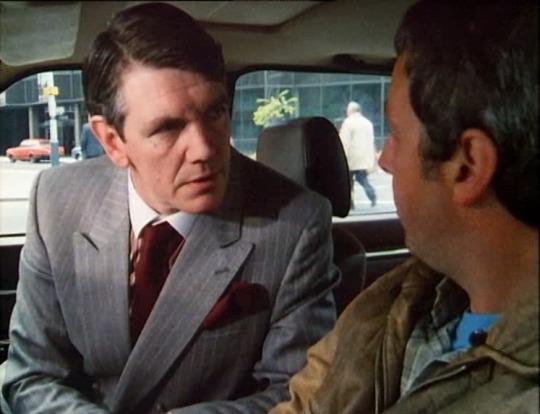

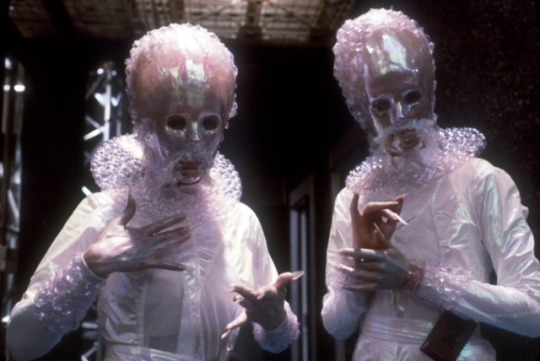

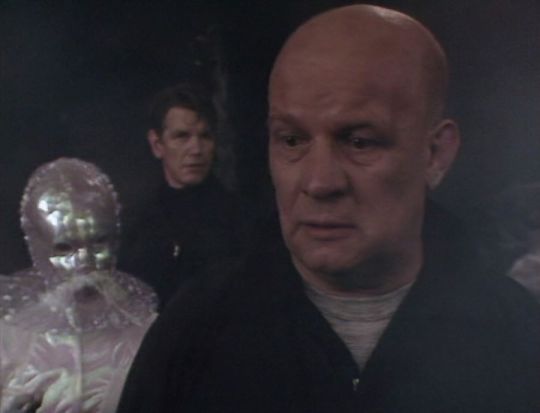
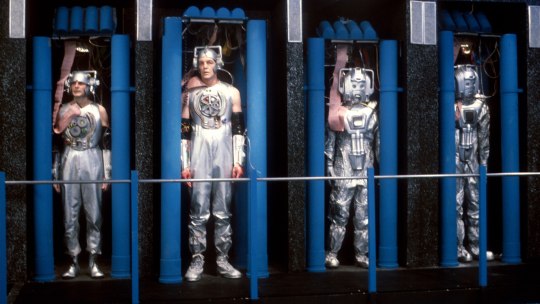

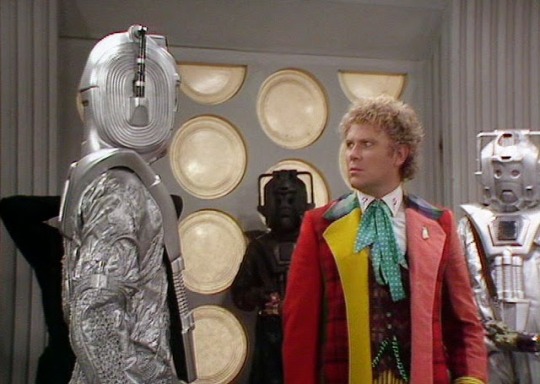
Doctor Who: Attack of the Cybermen (22.1, BBC, 1985)
"Unstable? This is me, Peri! At this very moment I am as stable as you will ever see me."
"Oh dear."
"You must forget how I used to be, I'm a Time Lord! A man of science, temperament and passion!"
"And a very loud voice."
"Yes. Yes, that too. But not unstable."
#classic doctor who#doctor who#attack of the cybermen#1985#paula moore#matthew robinson#six#colin baker#nicola bryant#maurice colbourne#brian glover#terry molloy#james beckett#jonathan david#michael attwell#stephen churchett#stephen wale#sarah berger#esther freud#sarah greene#faith brown#david banks#michael kilgarriff#still catching up on those DW's I missed for various reasons when i was devouring them as a kid; i definitely read the target book but#somehow i never saw the actual eps. i remembered the brave tragic cryons and lytton's heel turn... what i hadn't remembered was how lore#heavy and continuity invested this story is. i mean it's kind of complex as a fan‚ to an outsider this is incomprehensible! but it has some#good bits in it: Robinson's direction is stylish and favours dramatic closeups‚ Colbourne is always great even if Lytton barely makes sense#as a character by the end‚ and his repertoire with Glover is dynamite. there's quite a few plot holes left over at the end and the attempt#at pathos for the close is forced and unconvincing but the cryons are pretty cool looking and some of the references are cute#and Peri! i love Peri‚ even when she's having a tough time of it with a still newly regenerated Doc‚ poor love
49 notes
·
View notes
Text




















From the Golden Age of Television
Series Premiere
Rocky Jones, Space Ranger - Beyond the Curtains of Space Part 1 - Syndicated - February 23, 1954
Science Fiction
Running Time: 30 minutes
Written by Warren Wilson
Produced by Guy V. Thayer Jr.
Directed by Hollingsworth Morse
Stars:
Richard Crane as Rocky Jones
Scotty Beckett as Winky
Sally Mansfield as Vena Ray
Robert Lyden as Bobby
Maurice Cass as Professor Newton
Leonard Penn as Ranger Griff
Charles Meredith as Secretary Drake
Guy Prescott as Darganto (as Frank Pulaski)
William Hudson as Ranger Clark (as Bill Hudson)
#Beyond the Curtain of Space - Episode 1#Rocky Jones Space Ranger#TV#Science Fiction#1950's#1954#Syndicated#Richard Crane#Scotty Beckett#Sally Mansfield#Robert Lyden#Maurice Cass#Charles Meredith#Series Premiere
4 notes
·
View notes
Text
Poem: "Old Abraham" (1996)
Old Abraham: Historic Sycamore Tree in #Barboursville #WV #Appalachia #poets #poetry #writing #history #wvhistory #CivilWar

View On WordPress
#Appalachia#Barboursville#Bill Herndon#Cabell County#civil war#Huntington#Main Street#Maurice E. Beckett#Morris Harvey College#Old Abraham#poems#poet#poetry#Tanyard Branch#Union Cavalry#West Virginia#writers
1 note
·
View note
Text
Ok, I am the only one who became obsessed with Pelléas and Mélisande after listening to this?
For context: "Pelléas and Mélisande (French: Pelléas et Mélisande) is a Symbolist play by the Belgian playwright and author Maurice Maeterlinck. It's about the forbidden, doomed love of the title characters and was first performed in 1893.

The work never achieved great success on stage, apart from operatic setting by Claude Debussy, but was at the time widely read and admired by the symbolist literary elite, such as Strindberg and Rilke. It inspired other contemporary composers, like Gabriel Fauré, Arnold Schoenberg, Jean Sibelius, and Mel Bonis.
Synopsis: Golaud finds Mélisande by a stream in the woods. She has lost her crown in the water but does not wish to retrieve it. They marry, and she instantly wins the favor of Arkël, Golaud's grandfather and king of Allemonde, who is ill. She begins to be drawn to Pelléas, Golaud's brother. They meet by the fountain, where Mélisande loses her wedding ring. Golaud grows suspicious of the lovers, has his son Yniold spy on them, and discovers them caressing, whereupon he kills Pelléas and wounds Mélisande. She later dies after giving birth to an abnormally small girl. Source: Wikipedia.
A very interesting aspect is that it is a Symbolist play adapted numerous time, but especially by Debussy as an opera, that I'm sure Lestat has **convinced** Louis to watch 😄
Also on Wikipedia: "A brief summary of the play will concentrate best on Mélisande. At the beginning of the play she has just escaped from a failed marriage that has so traumatized her that she scarcely remembers either it or her past. She marries Golaud with no choice of her own, and remains essentially distant from him. The audience realize she is falling in love with Pelléas long before she does. On her deathbed she has quite forgotten her final meeting with Pelléas and his death, and dies without realizing that she is dying. This and the whole play—for none of the other characters are wiser—expresses a sense that human beings understand neither themselves nor each other nor the world. The problem is not simply human blindness, but the lack of a fixed and definable reality to be known. This is the Maeterlinck who paved the way for the plays of Samuel Beckett.
A key element in the play is the setting, whether visible in the stage scenery or described in the dialogue. The action takes place in an ancient, decaying castle, surrounded by deep forest, which only occasionally lets sunlight in, and with caverns underneath it that breathe infected air and are in danger of collapse. As numerous critics have pointed out, all this symbolizes the dominating power throughout the action of a destiny fatal to mankind. "
I just love how specific this is, how appropriate and how evocative the whole story is of Louis and Lestat, and I love how Louis does remember it and includes it in his Dreamstat version of it in Paris 🙈

#loustat#amc immortal universe#lestat#lestat x louis#louis de pointe du lac#lestat de lioncourt#come to me#daniel hart#amc iwtv#iwtv#iwtv soundtrack#come to me again#iwtv ost#pelléas and mélisande#Spotify
29 notes
·
View notes
Text
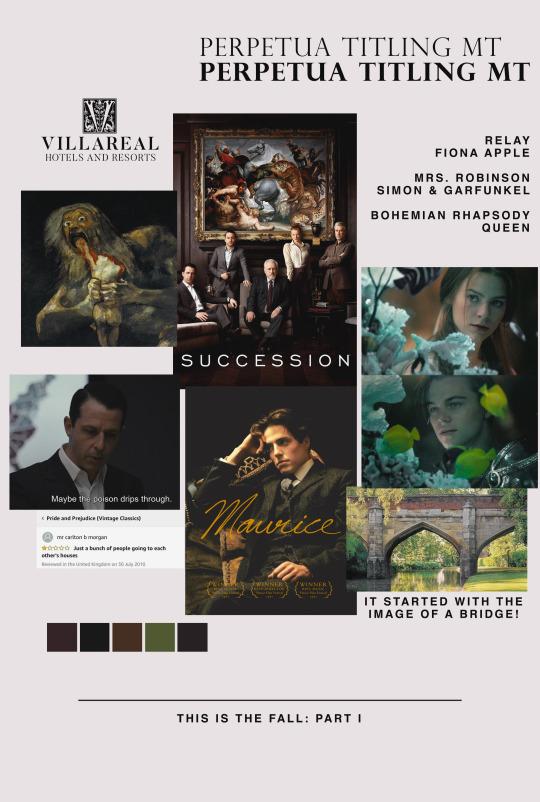
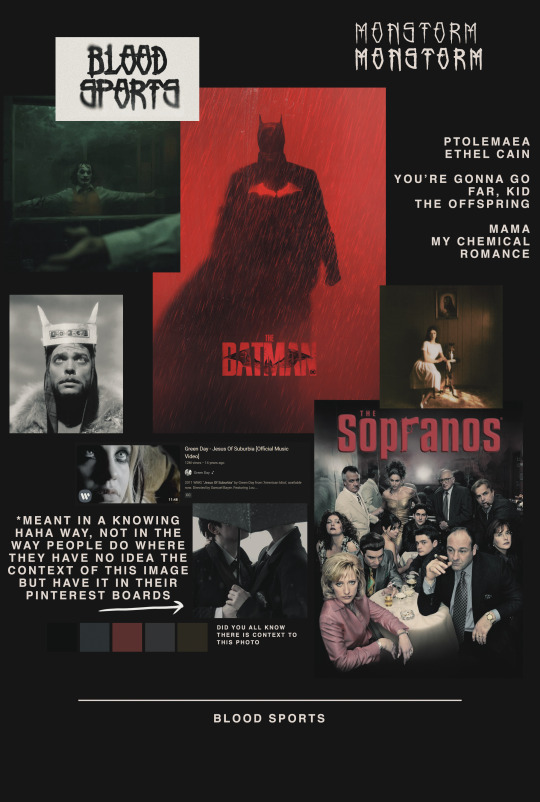
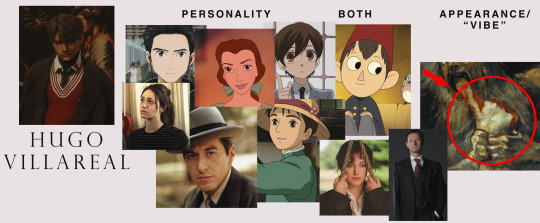
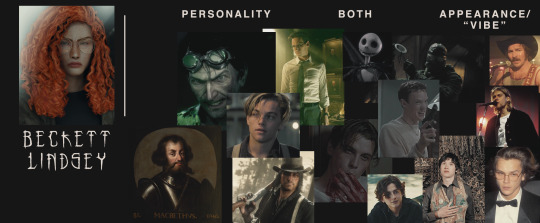
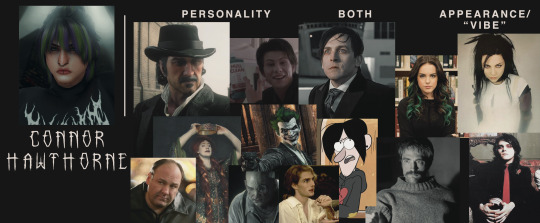
character/story influences tag
Rules: Write up a blurb or make a visual collage of the people or characters (from books, TV shows, movies, etc.) that inspired your OC, either visually, personality wise, or just a general vibe.
i misremembered this tag completely it was all about characters the whole time and i hallucinated the story part? so i guess everyone who did the character version like 2 years ago has to do the story version now sry
tagging @literalite idk who else hasn't done it do it!!!!!! it's fun!!!!!!!!!!!!!!!!
(media/characters in order)
this is the fall: succession, maurice, romeo and juliet, saturn devouring his son, that random dark academia bridge i saw that one time on tv that birthed the entire idea amen
blood sports: the batman, the sopranos, macbeth, joker, jesus of suburbia music video, preacher's daughter
hugo: fiona from shameless, yuuri from yuri on ice, belle, michael corleone, haruhi from ouran, sophie from howl's moving castle, wirt, elizabeth from pride and prejudice, mycroft holmes, saturn's son
beckett: macbeth, arkham riddler, jack dawson, john marston rdr2, gotham riddler, billy loomis, jack skellington, stu scream, dano riddler, timothee chalamet's guy in lady bird, pretty odd era ryan ross, lead singer of midland specifically in the burn out video (it's where the mustache was birthed), kurt cobain, river phoenix
connor: dutch rdr2, tony soprano, lady macbeth, arkham penguin, jd heathers, arkham origins joker, lestat, gotham penguin, robbie gravity falls, robert pattinson in the lighthouse, jade from victorious, amy lee, revenge era gerard way
#technically..beckett was doing the slouchy army green jacket and murder before 2022 eddie. but we're gonna let him have it#veronica from heathers probably should have been on beck's too but i had already given them lady macbeth and macbeth like WE GET IT ALREADY#a character from the lighthouse right next to a character from victorious is CRAZY but. it's true. i mean.#jade was just gonna be on the vibe/appearance side but i was like i cannot sit here and act like her personality isn't exactly connor#the batman is still the biggest inspiration for blood sports. but if i could infuse an ounce of whatever crack they put in the-#-jesus of suburbia music video that had me watching it at least once a day every day in the 7th grade. the vibes are there i think honestly#this is the fall: extras#blood sports#ts4#hugo villareal#beckett#connor
70 notes
·
View notes
Text
More disney mirrorverse headcanons now that there’s a ton of new guardians
The Guardian Beast is from a timeline where Belle and Maurice never found him, so eventually he decided to put his beastly form to use and protected his woods and his servants. He’s never traveled beyond the borders of the forest before
When Belle saw Beast, she actually thought it was her Adam for a moment and her heart broke when Mickey told her the truth. As a result their relationship is a bit awkward but for now they’re very good friends.
Kermit is actually from a very different timeline, where all the muppets are jesters and actors at their kingdom’s local theater. Kermit’s very happy at the theater, but he’s always wanted to be a knight.
In Elizabeth’s timeline, she ditched Will and Jack and took the pardon for herself, willing to become a privateer in exchange for the freedom of all other pirates who sail under her colors. As long as she meets a certain demand for Beckett she can do whatever she likes
Alice runs a nice little tea shop in the Stellar universe and is renown for the unbirthday parties she throws
Tigger actually joined the Guardians completely by accident. He was camping with his friends and went on a hike, and ended up hopping into the mirror portal cause he didn’t look where he was going
#disney#disney mirrorverse#nerd talks#headcanon#kermit the frog#elizabeth swan#the beast#adam#alice#tigger
47 notes
·
View notes
Photo

HELENA BONHAM CARTER IN CONVERSATION WITH SIMON CALLOW | THE LONDON LIBRARY MAGAZINE | APRIL 2023
Helena Bonham Carter was joined by the writer and fellow actor Simon Callow at home this spring to discuss her new role: Library President. The two are longtime members and met filming the 1985 EM Forster adaptation A Room With a View. Bonham Carter was 19. It was the first of many Merchant Ivory productions for her, including Maurice and Howards End, before Hollywood called, with a role as the suicidal love interest in David Fincher's Fight Club. Work with her former husband, Tim Burton, came next, as well as a contribution to the Harry Potter franchise and more.
Callow's acting career includes stage roles in Shakespeare, Beckett, pantomime and contemporary theatre and beloved British films such as Four Weddings and a Funeral. He is a biographer of Oscar Wilde and Orson Welles and a renowned Dickens expert. This conversation has been edited and condensed for clarity.
HELENA BONHAM CARTER: Simon, it's very nice to see you here. Welcome to my Presidential home! I'm not having a clever day - do you find that, or are you always clever?
SIMON CALLOW: Always. But I think I might be daunted by being the President of The London Library. Such a wonderful title, such a wonderful entity.
HELENA: I love the title. The older I get, the more I like having conversations with dead people - for instance my dad, who made me a member when I was 21. For the Library to then ask me to be President...
SIMON: Fantastic.
HELENA : I used the Library a lot then, which was also when I first met you. I was sort of roaming and feeling lost, having a great time filming but feeling out of my depth everywhere. My peer group had gone to uni, and I was suddenly just on my own path and really unequipped to deal with it. I had a massive chip on my shoulder. So The London Library was my college. I felt legitimate, and I thought I could wander in and dress up like Virginia Woolf.
SIMON: It's like going right back to the source, isn't it? There it all is, and there they were.
HELENA: There they were! It's not only a conversation with my dead dad, but a conversation with EM Forster. If it was not for him, we wouldn't be here.
SIMON: A Room With A View is my favourite film of all the films I've been in, and I'm still astonished by its freshness.
HELENA: It still works.
SIMON: It really does. It was my second film and I was incredibly relieved - I'd been in Amadeus and detested every second. When I got the script [for A Room With A View] Ismail [Merchant, the producer] said to me: "We want you to play the leading part!" So I thought, "This is great, he sees me as George. I'll go on a diet immediately." Then my agent discovered I was in fact playing the Reverend Beebe. And I thought, "No, outright no." I was terribly hurt.
HELENA: And totally miscast.
SIMON: Beebe's the fat old parson; I can't possibly play him. Finally I gave in to discover that suddenly I was with the aristocracy of British film and theatre: Maggie [Smith], Judi [Dench] and Fabia Drake, no less. And you. Who was completely new.
HELENA: I was a foetus.
SIMON: What I remember about you then was the incredible speed with which you spoke.
HELENA: Oh, seriously? That's like my daughter.
SIMON: You would change tack in the middle of a sentence and contradict yourself.
HELENA: I don't think that's changed. I'm interested that I spoke at all. I remember myself as a mute, a total mouse, and so in awe of everyone. I was aware that you were a writer and talking about Mozart a lot, so I thought, "He's the Renaissance man that I have to become." Also, without being too indiscreet, you were one of the kinder adults.
SIMON: Fabia was an absolute holy terror. What was great was to be working on a script drawn from such a wonderful novel. Ruth [Prawer Jhabvala, who adapted the original novel for the film] incomparably excelled at weaving the words from the novel into a real script, so that these were really people talking to each other. My favourite scene in any movie I've acted in is our scene at the piano.
HELENA: It was the most important scene. You, as Mr Beebe, caught Lucy [Honeychurch, my character] playing in private. He's so tender and I love that. "If only you knew how to live as you play."
SIMON: Beebe, certainly as written by Ruth - less so by Forster actually - is essentially benevolent. I remember the first read through, in London somewhere?
HELENA: I was terrified. Maybe it was the first time I read with Maggie and Judi.
SIMON: Maggie terrified me by saying, "Why are you calling him 'Beebe'? It has to be 'Bee-be'. Beebe sounds as if we're at the Beeb!" Were you always a great reader of novels?
HELENA: Quite a good reader, though I was slow. I was taught at English A Level by Penelope Fitzgerald.
SIMON: I knew and loved her. Was she a good teacher?
HELENA: Extraordinary. Did you ever read Offshore? I love that. But I thought it would be good to look as if I read, because then every heroine in every book or film was a reader or writer. I wanted to be Judy Davis in My Brilliant Career. It was probably quite healthy, instead of fixating on a physique, which is what most people do these days because of Instagram. I wasn't very sexual for a long time.
SIMON: You were wearing lots of clothes.
HELENA: So many clothes.
SIMON: One couldn't even begin to guess what the woman beneath would be.
HELENA: No, there wasn't a body.
SIMON: It was extraordinary, you were a sort of Oxfam shop on two legs.
HELENA: I don't know where that came from. I think I had a real complex. Maybe because I was in such a male world. I went to Westminster [School], which was all boys, so before I even walked into period movies, I was dressed as a Victorian. It was always about pretending to be in the past. I over romanticised or felt I belonged in the past, actually.
SIMON: The biggest relationships in my young life were with my grandmothers. I asked one to make me an 18th-century costume for a Christmas present.
HELENA: Oh, I love that. So you dressed up as Mozart?
SIMON: In effect. I loved the fabrics, the shimmer of it all.
HELENA: On Maurice [1987] I did hair and makeup for all the men, which was rather a good way of dating people. It was Tinder then. In terms of influence, how important were your parents?
SIMON: The only one of my family that read novels was my grandmother, though she never talked about them. A book can be just for you. You have a relationship with the characters and have somehow subsumed them into your psyche.
HELENA: I always feel like you want to share the wonder.
SIMON: Your family are very literary, aren't they?
HELENA: Well, my grandmother Violet definitely was, on my dad's side. She was [Prime Minister H H] Asquith's daughter [and president of the Liberal Party from 1945-47]. My maternal grandmother was a special character, but found it difficult to read. I think she would have been diagnosed as dyslexic now, but she wrote beautifully. My mum, her whole life has never been without several books. My dad developed cortical blindness, which meant he couldn't see faces, but could read, so he read his way through the last 24 years of his life. We had half of The London Library in our home because they'd send him books.
SIMON: Oh, fantastic.
HELENA: Violet was formidable and wrote a lot of letters. I came back from filming with Woody Allen in a monastery in Taormina, and Dad was editing them. There was a postcard to her husband in 1940 saying: "Have just finished Morgan's latest Howards End." She knew Edward Morgan Forster. When I came to film Howards End with you, I read Violet's [unfinished] autobiography and thought, "Oh god, she was basically like the Helen Schlegel character, a sort of radical bohemian, a bluestocking..." And would have been the same age. So maybe she was a bit of a model for Helen.
SIMON: Forster wasn't a recluse until later at King's College Cambridge, I think.
HELENA: Did you ever get a sense of what he was like?
SIMON: Everything in his life was the opposite of what he espoused: the passion, the connecting. This gives his work its force, because it didn't come easily to him. He had to struggle to make it happen.
HELENA: He did have relationships though, didn't he?
SIMON: Famously with a married policeman, Bob Buckingham. But also earlier, in Alexandria, and later, with a Bulgarian art collector, 45 years his junior. All very discreet. As a young gay man, I was impatient with him. Instead of thinking how extraordinary it was for its time, I just thought, "Come on, we've gone beyond all of this". It felt a bit spinsterly. Now I think it's passionate and unbelievably brave and exquisitely written. Then, I was more taken by DH Lawrence, which was all oceanic... My entire ambition was to be a writer. Do you write?
HELENA: I've been asked to, and I've written the odd article. My attention span is troubling, but I do enjoy it when I apply myself.
SIMON: I have to work very hard at it, and do terrifically long days. I can be at the laptop by seven.
HELENA: In the morning? Jeez. OK, so you've got Morning Brain.
SIMON: I've got a night brain, too. But no afternoon brain.
HELENA: The afternoon is not really good for much.
SIMON: Yes. I have difficulty in the theatre, rehearsing in the afternoon.
HELENA: I have to have a snooze, no matter what. The snooze has been a pillar of my living. Do you ever write in books when you're reading them, or is that sacrilegious?
SIMON: I do when I'm reviewing, but that's with proofs, so I can scrawl all over them.
HELENA: I've got a thing about having a relationship with a book, so I will, unfortunately, write sentences in them. Also in the hope that somehow it's going to stick in the brain.
SIMON: Let's talk about the Library - its location, for instance. St James's Square is enchanting.
HELENA: Yes, and I do think that places work magic on us and influence what we think. It is very creative. Also, just silence. To go and sit with others with no danger of conversation, but you've got the company of other people concentrating. If you're going to seriously write, it could be very lonely. You have to go to battle with yourself, but it's alleviated at the Library because you're with other people who are going into battle with themselves.
SIMON: Libraries generally have a very curious combination of this quietness and focus, coupled with a very sexy feeling. It's the silence.
HELENA: I was going to raise that, but you start.
SIMON: I wonder why that is exactly. It's just because everybody's in their own space and in their own world somehow, and you know that as you drift into that sort of semi hypnotic state, sex is going to be in there somewhere.
HELENA: Yeah, it's always there.
SIMON: So it's the subconscious. It's sort of milling around the Library. I think I said this before, it's like a book bordello. You just go up and take whatever you want to.
HELENA: Have your pleasure. I like that.
SIMON: The Library's postal service is also miraculous. And everyone's so sympathetic. Years ago, my dog acquired a passion for 17th-century literature; it turns out it was the fish glue used to bind the spines. One day I came home and there was a priceless volume in pieces all over the place. I offered to replace it somehow but the Librarian said: "I have dogs; I understand."
HELENA: How do you use the Library?
SIMON: Not for writing or reading. Just to borrow books. The collection of arcana is vast. Writing about Orson Welles, I needed to know what it was like to be a tourist in Morocco in 1930. The Library had six - six! - guides from the period. I don't know anywhere else I could have found that. I love clambering up the metal stairs and finding things that nobody's taken out for 100 years.
HELENA: You think George Eliot is going to actually appear.
SIMON: It still is enchanting to me to do that.
HELENA: As a writer, do you have a ritual?
SIMON: Procrastinate as long as possible. I was so relieved to discover that Ibsen could spend four hours rearranging his desk before starting to write. Unlike Dickens.
HELENA: He just sat down?
SIMON: He was always writing at least two things at once, sometimes more - he wrote the last of The Pickwick Papers and the first chapters of Nicholas Nickleby simultaneously. He worked it all out, I'm sure, on his long walks.
HELENA: Have you seen his original manuscripts?
SIMON: Almost illegible; you feel the heat of his creative energy. He talks about the characters dancing down the pen.
HELENA: I love that - when somebody takes possession.
SIMON: As with acting: when it's good, it's not you playing the character, it's the character playing you.
#helena bonham carter#simon callow#the london library#interviews#2023#interviews: 2023#the london library magazine 2023
37 notes
·
View notes
Note
Consigli dei libri per crearsi una cultura letteraria?
Questa è una domanda che viene posta parecchie volte, e mi fa sempre piacere ci siano ancora persone interessate alla letteratura, ma il motore dovrebbe appunto essere il piacere di leggere, l’interesse autentico, non con la finalità di crearsi una cultura letteraria, perché ognuno ha la sua e una non vale meno di un’altra. Ma certamente rispondo alla tua domanda, perché esistono dei libri che ritengo imprescindibili, ci metto dentro pure un po’ di teatro e poesia.
I fratelli Karamazov, Dostoevskij
L’Idiota, Dostoevskij
Delitto e Castigo, Dostoevskij
Il giocatore, Dostoevskij
I demoni, Dostoevskij
Anna Karenina, Tolstoj
Resurrezione, Tolstoj
Padri e figli, Turgenev
La caduta, Camus
La peste, Camus
Saramago, tutto
Il mito di Sisifo, Camus (questo è un saggio, ma lo aggiungo, già che ci siamo)
Dissipatio H.G, Guido Morselli
Le onde, Virginia Woolf
Mrs Dalloway, Virginia Woolf
Gita al Faro, Virginia Woolf
Orlando, Virginia Woolf
I racconti di Virginia Woolf.
Il mondo nuovo, Huxley
Narciso e Boccadoro, Hesse
Siddhartha, Hesse
Il lupo della steppa, Hesse
Maurice, Foster
I dolori del giovane Werther, Goethe
Il ritratto ovale, Edgar Allan Poe
Il libro dell’inquietudine di Bernardo Soares, Pessoa
La scopa del sistema, Wallace
I racconti di Wallace
Purity, Franzen
Camere separate, Tondelli
Altri libertini, Tondelli
Jane Eyre, Charlotte Brontë
La nausea, Sartre
Il ritratto di Dorian Gray, Wilde
Illusioni perdute, Balzac
(E tanti altri…)
Teatro:
Tutto Molière
Tutto Brecht
Tutto Beckett
Tutto Pinter
Tutto Camus
Poesia:
Pessoa (tutta)
Pasolini (tutta)
Emily Dickinson (tutta)
Radnóti, scritto verso la morte
Rimbaud (tutto)
Baudelaire (tutto)
Corazzini (tutto)
Montale (tutto)
E tanto altro che ora non mi viene in mente. Spero di averti dato qualche spunto :)
34 notes
·
View notes
Note
can i… hav some reading recs 🤍👀
ooooh yes!!!! i constantly wish i was more well-read than i am but here is an exhaustive list of everything that's ever rewritten my brain chemistry a bit. if you follow me you have probably seen me post about most of these things at one point or another but if you want to download the exact same brainworms as me here's where you should start
asoiaf of course. best if you read it at a tender age such as thirteen but i digress
kitchen by banana yoshimoto
angels in america by tony kushner (see it on stage first if at all POSSIBLE!!!! but if not that's fine)
the once and future king by t.h. white (related reading: h is for hawk by helen macdonald)
the sparrow by mary doria russell
slaughterhouse five by kurt vonnegut (cats cradle by him is also good)
wolf hall trilogy by hilary mantel
severance by ling ma
alien tapes by geo wyeth (album) (not a book) (still counts)
aphorisms by kafka (i have the schocken books version, idk if there are different translations lol)
if jewish/interested in judaism: certain people of the book by maurice samuel (i could only find this through my university library sorry.)
moon woke me up nine times: selected haiku of basho (transl. david young)
waiting for godot by samuel beckett and rozencrantz & guildenstern are dead by tom stoppard but they have to be read one after the other and then put away frustratedly for being stupid absurdist bullshit for like a year until the brain realizes via hibernation that they are actually smart
drive my car (movie)
alita: battle angel (movie)
#if you are looking for recs of more recent reads lmk. also if you are interested in play recs!#or whatever#<33333 thank you for asking
30 notes
·
View notes
Text
classic lit is the only genre of book I buy every time because I just like to annotate and keep note thus I decided to make a read vs to be read of my classics as right now I do have a lot piled up I've been meaning to get to ALSO! I just like talking about classic lit
so please let me know which I should prioritise
physical tbr classics
zami: a new spelling of my name by audre lorde
a room with a view by em forster
the professor by charlotte bronte
a passage to india by em forster
mrs dalloway by virginia woolf
the last tycoon by f.scott fitzgerald
jamaica inn by daphne du maurier
if beale street could talk by james baldwin
howards end by em forster
dr jekyll and mr hyde by robert louis stevenson
antony and cleopatra by william shakespheare
a clockwork orange by anthony burgess
read classics below cut for my tracking
pre 1500s:
the iliad by homer
oedipus the king
1500-1800
the merchant of venice, hamlet, much ado about nothing, king lear pericles, the tempest, othello, measure for measure by william shakespheare
1800-1900
a tale of two cities, hard times, great expectations by charles dickens
heart of darkness by joseph conrad
jane eyre by charlotte bronte
wuthering heights by emily bronte
the tenant of wildfell hall by anne bronte
sherlock holmes by arthur conan doyle
the mill on the floss by george eliot
cousin phyllis by elizabeth gaskell
the moonstone by wilkie collins
little women by louisa may alcott
dracula by bram stoker
maurice, where angels fear to tread by em forster
sense and sensibility, persuasion, emma, pride and prejudice, northanger abbey by jane austen
the turn of the screw by henry james
frankenstein by mary shelley
treasure island by robert louis stevenson
the picture of dorian gray by oscar wilde
black beauty by anna sewell
peter pan by jm barrie
1900-1970
on the road by jack kerouac
dubliners, ulysses by james joyce
the great gatsby, tender is the night by f. scott fitzgerald
rebecca, the house on the strand by daphne du maurier
notes of a native son, giovanni's room by james baldwin
childhood by tove ditlevson
letters to a young poet by rainer maria rilke
voss by patrick white
my brilliant career by miles franklin
nightwood by djuna barnes
brideshead revisted by evelyn waugh
their eyes were watching god by zora neale hurston
one hundred years of solitide by gabriel garcia maquez
wide sargasso sea, good morning midnight by jean rhys
passing by nella larson
the waste land, the lovesong of j.alred prufrock by t.s eliot
to the lighthouse, a room of ones own by virginina woolf
to kill a mockingbird by harper lee
sula by toni morrison
endgame by samuel beckett
things fall apart by chinua achebe
lord of the flies by willian golding
death of a salesman by arthur miller
a streetcar named desire by tenneesee williams
animal farm by george orwell
2 notes
·
View notes
Text
Ten Characters, Ten Fandoms, Ten Tags
I was tagged by @nerdgatehobbit. Thank you. I do love a tag game. Sorry it took me so long to get to this.
1. Stargate Atlantis: Carson Beckett (McKay & Sheppard a hairsbreadth behind)

2. Stargate SG-1: Jack O’Neill

3. Leverage: Eliot Spencer

4. 9-1-1: Eddie Diaz

5. The Walking Dead: Daryl Dixon

6. Sherlock: Sherlock Holmes & John Watson (sorry they come as a pair. I don’t make the rules)

7. The A-Team: Murdock

8. Star Trek Enterprise: Trip

9. Star Trek The Next Generation: Data

10. Third Watch: Maurice ‘Bosco’ Boscorelli (I struggled for the 10th but I’m going through a binge watch of third watch again and he is my fave)

tagging: @logicgunn @maverick-werewolf @colonelshepparrrrd @itstartedwithalex @annastarwarsfan @99point9percentwhump @a-storm-of-roses @sun-ni-day @jadzia-subatoi-torres @gingerpolyglot
If I’ve tagged you and you don’t want to do it feel free to ignore. I’ve lost track of who likes to do these games.
17 notes
·
View notes
Text


What I've read in 2022
(id/list under the cut)
not pictured because currently not at my place, but certainly in my head: tausend zeilen lüge (juan moreno), entschuldigen sie meine störung (jan-uwe fitz), versteckt (simon beckett), tender is the flesh (agustina bazterrica)
oh my god, what a year. ive read a magnificent 23 books in total, which - although short of my goal of 26 books - is 8 books more than i read last year!
my list is filled with new stories, books i had lying around in my bookshelf for quite some time already and also very old favourites that i took the time to revisit. i read 5 of the 9 books on my suggested reading pile of 2022 and 3 books from my list of books to reread in 2022.
although i did not love every single book ive read i certainly enjoyed the time i spent with all these old and new characters. if you'd like to know more about which books i liked the most, check out my reading recap 2022 tag where i will post some reflections during the next few days! :)
id: a tower of books stacked on a wooden bed table. top to bottom the english titles are: ninth house (leigh bardugo), arsene lupin - gentleman burglar (maurice leblanc), letters to a young poet (rainer maria rilke), the alchemist (paulo coelho), the dark side of the moon (martin suter), the reader (bernhard schlink), convenience store woman (sayaka murata), moby dick (abridged, herman melville), ordinary thunderstorms (william boyd), the war of the worlds (h g wells), maurice (e m forster), in my dreams i hold a knife (ashley winstead), shame (annie ernaux), aristotle and dante (1 and 2, benjamin alire saenz), the vampire diaries (1 - 4, lisa j smith) and house of leaves (mark z danielewski). end id.
#2022 reading recap#own post#booklr#literature#reading#books#contemporary literature#litblr#book rec#reading list#young adult literature#litblog
7 notes
·
View notes
Photo

Guy de Maupassant
(Aug. 5th 1850 - Jul. 6th 1893)
Brief Bio:
Guy de Maupassant was born near Dieppe, France, into a prosperous bourgeois family. After studying law, he served in the Franco-Prussian War of 1870-71, an experience that deeply influenced his writing. Maupassant initially worked as a civil servant, but under the guidance of Gustave Flaubert, soon turned to writing short stories, achieving fame with his first published story, "Boule de Suif," in 1880. His mastery of the short story form, characterized by its psychological insight, economy of style, and often ironic endings, solidified his reputation as one of the greatest French writers of his time. Maupassant's literary output was prolific, producing two to four volumes of stories a year. Despite suffering from syphilis and mental illness in his later years, Maupassant continued to write until his death in Paris at the age of 42.
Notable Works:
Boule de Suif (1880 short story)
Une Vie (1883)
A Vendetta (1883 short story)
Bel-Ami (1885)
Belhomme’s Beast (1885 short story)
The Necklace (1888 short story)
The Grave:
Maupassant is buried in Montparnasse Cemetery in Paris. The cemetery is divided by the Rue Emil Richard. He is buried in the smaller half of the cemetery, right in the middle of Division 26. Keep an eye out for an ornate white fence. He wrote his own epitaph: “I have coveted everything and taken pleasure in nothing.”
3 Boulevard Edgar Quinet
Paris, City of Paris, Île-de-France
75014 France
Surrounding Area:
Montparnasse is also the resting place of Samuel Beckett and Maurice Leblanc. The nearest Metro stop is Edgar Quinet.
Further Reading:
Guy de Maupassant Project Gutenberg
“You’ve never lived until you’ve almost died. For those who have fought for it, life has a flavor the protected shall never know.”
0 notes
Video
Irene Dunn, Charles Boyer | 💘Love Affair💘 (1939) | Romance Full Movie En...
Love Affair is a 1939 US romance film, starring Charles Boyer and Irene Dunne, and featuring Maria Ouspenskaya. The movie was directed by Leo McCarey and written by Delmer Daves and Donald Ogden Stewart, based on a story by McCarey and Mildred Cram. The movie became a surprise hit of 1939, showing McCarey's versatility after a long career of comedic films, and launching the surprising team-up of Dunne and Boyer. Academy Award nominations include Best Actress for Dunne, Best Supporting Actress for Ouspenskaya, Best Original Song, Best Writing (Original), and Best Picture. Irene Dunne as Terry McKay Charles Boyer as Michel Marnet Maria Ouspenskaya as Grandmother Janou Lee Bowman as Kenneth Bradley Astrid Allwyn as Lois Clarke Maurice Moscovitch as Maurice Cobert, an art dealer Scotty Beckett as Boy on the ship Dell Henderson as Cafe Manager Lloyd Ingraham as Doctor Frank McGlynn Sr. as Orphanage Superintendent Ferike Boros as Terry's landlady Never miss a video. Join the channel so that Mr. P can notify you when new videos are uploaded: https://www.youtube.com/@nrpsmovieclassics
0 notes